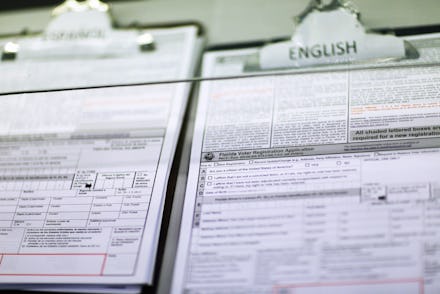New lawsuit claims Trump’s “voter fraud panel” violates the Watergate-era federal Privacy Act

The first order of business for President Donald Trump’s Commission on Election Integrity was supposed to be collecting data on millions of voters.
What Trump calls his “voter fraud panel” is racking up lawsuits instead.
Watchdog group Common Cause filed suit against the panel on Friday, joining other good-government and civil liberties organizations mounting legal challenges to the controversial federal commission.
Common Cause seeks to halt “the unlawful collection, maintenance, use and dissemination of the sensitive and personal voting data” the Trump panel has asked every state to provide.
The new case hinges on the federal Privacy Act of 1974, which regulates how government agencies collect, maintain and use records on individuals.
“Every eligible American has a right to an equal voice and vote in the future of their family, community, and country,” Common Cause President Karen Hobert Flynn said in a statement announcing the filing in U.S. District Court for the District of Columbia.
“The Privacy Act was passed in the wake of Watergate, when the Nixon White House compiled information on individuals with opposing political views,” she said. “It was wrong then and it is wrong now.”
Trump created his commission, which launched in May, after insisting he lost the popular vote for president because as many as 5 million ballots were improperly cast. He offered no evidence to back up his claims of pervasive fraud, which researchers and public officials alike have called unfounded and damaging to voter confidence in the electoral system.
Common Cause also wants the Department of Homeland Security and Social Security Administration “to stop seeking and using the voter history and party affiliation of voters, and return any such data it has already obtained from any state,” according to the release.
The commission, led by Vice President Mike Pence and Kansas Secretary of State Kris Kobach, is supposed to examine issues of election security, fraud and suppression. In part because of the data it seeks, it has run into coast-to-coast resistance, with election administrators across the U.S. saying they’d provide only limited voter data or none at all.
The offices of Pence and Kobach did not immediately respond to requests for comment Friday.
Kobach, a Republican candidate for governor of Kansas, said in recent interviews that the commission isn’t pushing states to provide any information they can’t release by law.
“The hysteria from the left is based on fake news,” he tweeted Friday amid scattered reports of voters pulling their registrations for fear the election panel could put their private information at risk.
Some secretaries of state say they do worry the panel could lump millions of voter records into a vulnerable central database that could fall prey to identity thieves or even foreign adversaries. Other skeptics suspect the group’s true aim is to push changes to election law that would make it harder to vote.
The White House this week posted more than 100 pages of written comments submitted by the public ahead of the commission’s first meeting on July 19. Many excoriated the panel for requesting data as personal as voters’ party affiliation and even partial Social Security numbers.
Some of the comments posted included the writers’ full names, addresses and phone numbers. A July 5 Federal Register notice did specify that commenters’ “names and contact information” could be made public — but the files posted on whitehouse.gov included emails dated as far back as June 29.
Daniel Jacobson, a former Obama White House attorney now assisting with legal action against the panel, pointedly noted that while citizen commenter information appeared online in full, the panel’s own internal communications were redacted before posting:
While the outcry against the panel’s requests and possible aims continues, the commission has already asked states in a July 10 email to hold off on supplying voter data thanks to a lawsuit filed by the Washington-based Electronic Privacy Information Center.